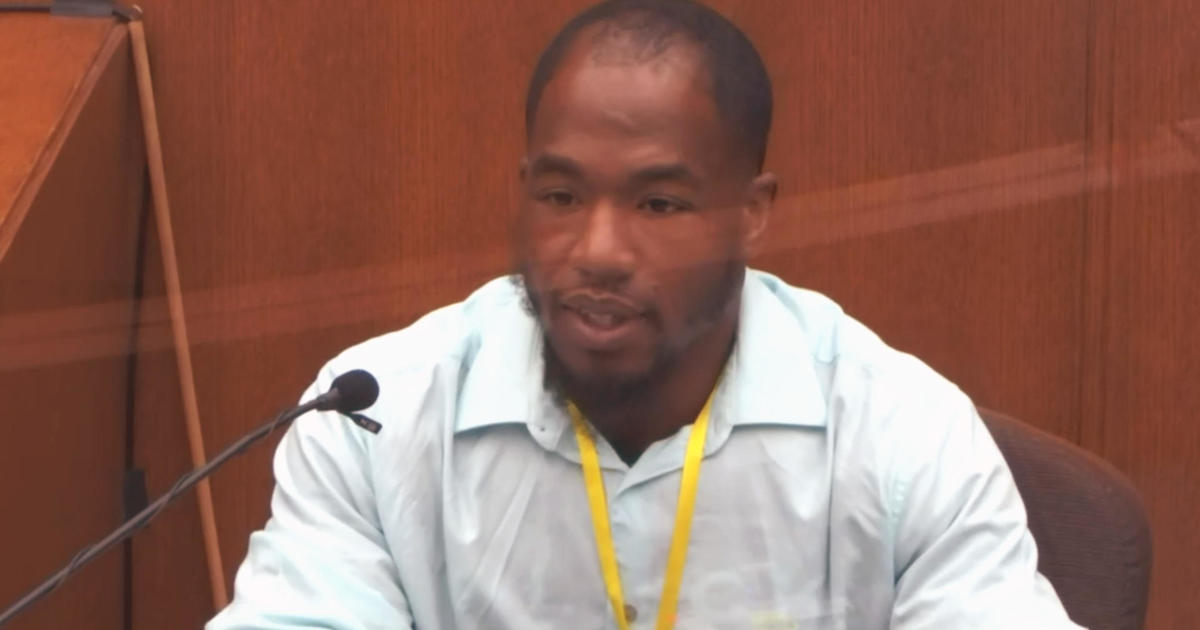Mpls. Police, City Engage In 'Discriminatory, Race-Based Policing,' Human Rights Dept. Probe Finds
Originally published on April 27
MINNEAPOLIS (WCCO) -- The Minnesota Department of Human Rights released the findings of its investigation into the city of Minneapolis and its police department Wednesday morning, finding a pattern of race-based discrimination over the last decade.
"Following its investigation, the Minnesota Department of Human Rights finds that the City of Minneapolis and the Minneapolis Police Department engage in a pattern or practice of race discrimination in violation of the Minnesota Human Rights Act," the findings state.
The investigation launched on June 1 of 2020, a week after former MPD officer Derek Chauvin murdered George Floyd. Human Rights Commissioner Rebecca Lucero said the MNDHR launched the investigation after "demands to end any discriminatory policing practices reverberated across the world."
READ MORE: The Chauvin Verdict: A Look At What's Changed 1 Year On
The department looked at the last 10 years of practices, policies and procedures within MPD. This was the first state civil rights investigation into the Minneapolis Police Department in history.
The specific examples of "discriminatory, race-based policing" the 72-page report found were:
- "Racial disparities in how MPD officers use force, stop, search, arrest, and cite people of color, particularly Black individuals, compared to white individuals in similar circumstances."
- "MPD officers' use of covert social media to surveil Black individuals and Black organizations, unrelated to criminal activity."
- "MPD officers' consistent use of racist, misogynistic, and disrespectful language."
WEB EXTRA: Read the full report.
The report found that of the 14 people Minneapolis police have killed since 2010 -- 13 were people of color or Indigenous people. Those individuals represent just 42% of the city's population, but comprise 93% of killings by Minneapolis police between Jan. 1, 2010 and Feb. 2, 2022 -- the date an MPD officer shot and killed Amir Locke.
"In other words," the report states, "MPD officers have disproportionately killed community members of color and Indigenous community members."
A use of force review found Minneapolis police were more likely to use both neck restraints and chemical irritants on Black people than white people in similar circumstances -- in the former case, nearly twice as likely. Overall, the report found Minneapolis police used "unnecessary and inappropriate force" in more than half of the instances in which they used neck restraints, and more than a third of chemical irritant uses. That's across individuals of all ethnic backgrounds.
The report reviewed nearly 73,000 traffic stops by MPD between 2017 and 2020, finding that, despite comprising only 19% of Minneapolis' population, Black people accounted for 54% of the stops. Minneapolis' population is 63% white, and white people accounted for 33% of traffic stops.
"Furthermore, current and former high-level City officials, MPD supervisors, and patrol officers admitted that MPD stops vehicles with people of color for either no genuine reason or for low-level violations in an effort to find guns or drugs in cars operated by people of color," The report states.
The report also found MPD officers were more likely to search, cite, use force against and arrest Black people during traffic stops.
A review of more than 700 hours of body camera footage, discipline records, more than 2,200 interviews with community members, and officer interviews found some MPD officers and supervisors use racial slurs, including the N-word, and misogynistic language, and that officers were rarely disciplined for these behaviors.
The report also found officers used fake social media accounts to "surveil and engage Black individuals, Black organizations, and elected officials unrelated to criminal activity, without a public safety objective." Police used these accounts to pose as citizens and send private messages to criticize elected officials, including a Minneapolis city councilmember and state official. Lucero said such action can "undermine the democratic process."
Hennepin County prosecutors told investigators that Minneapolis officers "are much less professional and respectful than officers from other police departments" they work with.
Investigators found the causes of the race-based policing to be an "organizational culture" in which:
- "MPD officers, supervisors, and field training officers receive deficient training, which emphasizes a paramilitary approach to policing that results in officers unnecessarily escalating encounters or using inappropriate levels of force."
- "Accountability systems are insufficient and ineffective at holding officers accountable for misconduct."
- "Former and current City and MPD leaders have not collectively acted with the urgency, coordination, and intentionality necessary to address racial disparities in policing to improve public safety and increase community trust."
MPD's trainings "reinforce a culture that exacerbates a pattern of race-based policing," the report outlines, emphasizing the inexperience of selected trainers "and an 'us-versus-them mentality' and 'warrior mindset' present in the trainings."
"For example, MPD selected some officers to serve as defensive tactics trainers simply because they had jujitsu skills, without vetting whether the officers were in fact quality trainers. When selecting trainers, MPD does not prioritize an officer's knowledge of adult learning principles, certification showing that they possess advanced expertise relevant to the training topic, knowledge of and adherence to MPD policies, alignment with MPD's stated vision and mission, or whether the officer has a record of non-discriminatory policing."
The report also outlines how MPD "does not provide its officers with appropriate, timely, or adequate in-service training on important policies and policing practices." In particular, the report notes how the police department has changed its use of force policies multiple times since Floyd's murder, but has failed to implement the new policies "in a meaningful way." Some officers told investigators they received a 15-minute narrated PowerPoint with the new changes, and a "high-level readout."
One of the primary issues with accountability and oversight that the investigation found was a lack of a "meaningful independent review process ... for assessing MPD officers' conduct."
"Almost every investigation of a police misconduct complaint against an MPD officer, no matter how preliminary, is assessed or guided by sworn MPD officers," the report states.
Lucero added during a press conference Wednesday that the investigation found fault not just with MPD but with city leaders, whose "vacuum of collection action" led to a culture at MPD that has existed "unchecked."
"This is an opportunity though, as we're looking for a new police chief to look for this kind of leadership that's really necessary to provide that sustained oversight," she said.
WATCH: Officials address racial discrimination by MPD, city
The investigation included review of more than 700 hours of body camera footage and 480,000 pages of documents, as well as observation of 87 hours of training footage and multiple ride-alongs.
In addition to interviewing officers from every level of the police department, investigators reviewed statements from more than 2,200 community members about their experiences with Minneapolis police.
The Department of Human Rights said it will now work with the city to develop a consent decree -- a list of court-enforceable changes to be made along with timelines for those to occur.
Lucero said the decree was "unprecedented," but will provide the "structure that is necessary because it provides clear guidelines and accountability." A judge will oversee the decree, which means that it will not get lost in election cycles as the city moves forward, she added.
Before then, though, the Department of Human Rights outlined three things the city and its police department can do to affect change right now: improve police accountability and oversight, improve the quality of training and "communicate honestly with members of the public."
"We absolutely can do this, and we must do this," Lucero said, even as the Minneapolis police department grapples with staffing problems prompted by the mass departure of officers in the last two years.
"Race-based policing is unlawful and especially harms people of color and Indigenous individuals–sometimes costing community members their lives," the report states. "Without fundamental organizational culture changes, reforming MPD's policies, procedures, and trainings will be meaningless."
At a press conference Wednesday afternoon, Minneapolis Mayor Jacob Frey addressed the report. "I found the contents to be repugnant, at times horrific," he said. "They made me sick to my stomach and outraged and I think our community felt the same way."
"I didn't run for reelection because I thought that there was a problem with policing. I didn't take this job because we believed the work was done. We have a hell of a lot of work to do as a city, we have a hell of a lot of work to do as a nation," he said.
WATCH: Mpls. Leaders React To Scathing MPD Report
Last year, Chauvin was convicted of murdering Floyd and sentenced to 22-and-a-half years in prison. He also pleaded guilty to violating Floyd's civil rights in a federal case. In February of this year, a federal jury found three other former officers -- Tou Thao, Thomas Lane and J. Alexander Kueng -- guilty of violating Floyd's rights. The officers' state trial is scheduled to begin June 13.
"The Minnesota Department of Human Rights' report on the patterns and practices of the Minneapolis Police Department from 2010-2021 validates what Black residents have been telling us for decades about discriminatory practices by the MPD," Minneapolis community activist Don Samuels said.
The United States Department of Justice is also investigating the Minneapolis Police Department.



